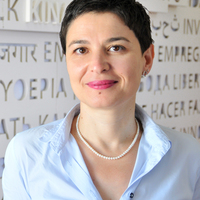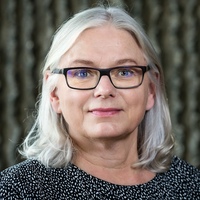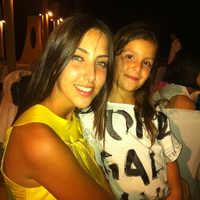
Mara Clemente
Integrated researcher at the Center for Research and Studies of Sociology (CIES-IUL) of the University Institute of Lisbon (ISCTE-IUL) and associate researcher of the Emigration Observatory (OEm) of the same institute.
I'm currently working on a research project entitled “The Construction of Counter-Trafficking Regimes in Mediterranean Europe: Actors, Discourses and Representations”, whose main objective is to analyse anti-trafficking systems in Southern Europe (2018-2024).
I'm currently working on a research project entitled “The Construction of Counter-Trafficking Regimes in Mediterranean Europe: Actors, Discourses and Representations”, whose main objective is to analyse anti-trafficking systems in Southern Europe (2018-2024).
less
Related Authors
Hamadou Boiro
University of Iceland
Jónína Einarsdóttir
University of Iceland
cecilia varela
Universidad de Buenos Aires
Octávio Sacramento
Universidade de Trás-os-Montes e Alto Douro (UTAD)
Elena Agathangelou
Manchester Metropolitan University
EUGENE OWOBU
University Of Benin Nigeria
InterestsView All (13)










Uploads
Papers by Mara Clemente
Nas últimas décadas, o combate ao tráfico de pessoas tem-se consolidado gradualmente também em Portugal, através da ação conjunta de organizações governamentais e forças policiais com organizações não governamentais e internacionais. Apesar da falta de evidências, as preocupações envolveram, em primeiro lugar, as mulheres migrantes exploradas no mercado do sexo. No entanto, estas cedo deixaram de estar entre as primeiras preocupações de resgate e o tráfico sexual tornou-se um assunto tabu. O artigo questiona o desaparecimento da exploração sexual da ideia de tráfico, em Portugal. Para tal, analisa a construção do campo do combate ao tráfico no país, utilizando as fer-ramentas analíticas de campo e de encerramento ideológico. O artigo argumenta que, num contexto atravessado por conflitos violentos em torno da venda de sexo, bem como por um alto nível de isomorfismo institucional, o objetivo superior de construir o campo do combate ao tráfico restringiu a ideia de tráfico, da qual o tráfico sexual permanece substancialmente excluído.
(EG)
In recent decades, the fight against human trafficking has gradually been consolidated in Portugal through an alliance of government organizations and police forces with non-governmental and in-ternational organizations. Despite the lack of evidence, the concerns involved, first and foremost, migrant women exploited in the sex market. However, they are no longer among the first rescue concerns and sex trafficking became a taboo subject. The article questions the disappearance of sexual exploitation from the idea of trafficking in Portugal. For this purpose, it analyzes the construc-tion of the field of counter-trafficking in the country, using the analytical tools of field and ideologi-cal closure. The article argues that in a context of violent conflicts on the sale of sex, as well as a high level of institutional isomorphism, the overarching goal of building the field of counter-trafficking has restricted the idea of trafficking from which sex trafficking remains substantially excluded.
Despite the growing attention to trafficking in human beings, there is still a limited reflection on the experience of assistance and protection of trafficked persons. Focusing on the Portuguese case, the paper presents the results of the first study on the paths of (re)integration of trafficked migrants in the country. Particular attention is paid to the case of migrant women exploited in the sex market. The article moves from an extended empirical research based, among other things, on the collection of in-depth interviews with trafficked persons and actors in the anti-trafficking system as well as on the first experience of scientific observation in a Portuguese shelter for trafficked women. The paper highlights the limitations in the access to rights of trafficked migrants set by the current security paradigm in the management of human mobility. Simplistic, stereotyping and pathologizing conceptualizations of trafficked persons, their trafficking experiences and assistance necessities compound these limitations. The article suggests the opportunity of a strengthening of the presence in the field of civil society organisations, with an involvement of those with experience with sex workers and migrants.
Entre 2008 e 2014 foram sinalizadas em Portugal 1,110 pessoas traficadas. Cerca de um quarto dessas pessoas eram cidadãos de origem portuguesa. Tratava-se, principalmente, de homens explorados no trabalho, dentro ou fora do país. A experiência de alguns atores diretamente envolvidos na luta contra o crime de tráfico de seres humanos (TSH) permite entender melhor o problema. Estudos qualitativos aprofundados, com o envolvimento das pessoas traficadas, poderiam contribuir não só para o conhecimento do fenómeno como para melhor prevenir e assistir os cidadãos traficados.
(EG)
Between 2008 and 2014, 1,110 trafficked persons were reported in Portugal. About a quarter of the reported trafficked persons are citizens of Portuguese origin. They are mainly men, exploited workers, either within or outside the country. The experience of some actors directly involved in the fight to stem trafficking in human beings (THB) crime leads to a better understanding of the problem. In-depth qualitative studies, besides enhancing the knowledge of the problem, could also support effective prevention and the assistance of trafficked persons.
Nas últimas décadas, o combate ao tráfico de pessoas tem-se consolidado gradualmente também em Portugal, através da ação conjunta de organizações governamentais e forças policiais com organizações não governamentais e internacionais. Apesar da falta de evidências, as preocupações envolveram, em primeiro lugar, as mulheres migrantes exploradas no mercado do sexo. No entanto, estas cedo deixaram de estar entre as primeiras preocupações de resgate e o tráfico sexual tornou-se um assunto tabu. O artigo questiona o desaparecimento da exploração sexual da ideia de tráfico, em Portugal. Para tal, analisa a construção do campo do combate ao tráfico no país, utilizando as fer-ramentas analíticas de campo e de encerramento ideológico. O artigo argumenta que, num contexto atravessado por conflitos violentos em torno da venda de sexo, bem como por um alto nível de isomorfismo institucional, o objetivo superior de construir o campo do combate ao tráfico restringiu a ideia de tráfico, da qual o tráfico sexual permanece substancialmente excluído.
(EG)
In recent decades, the fight against human trafficking has gradually been consolidated in Portugal through an alliance of government organizations and police forces with non-governmental and in-ternational organizations. Despite the lack of evidence, the concerns involved, first and foremost, migrant women exploited in the sex market. However, they are no longer among the first rescue concerns and sex trafficking became a taboo subject. The article questions the disappearance of sexual exploitation from the idea of trafficking in Portugal. For this purpose, it analyzes the construc-tion of the field of counter-trafficking in the country, using the analytical tools of field and ideologi-cal closure. The article argues that in a context of violent conflicts on the sale of sex, as well as a high level of institutional isomorphism, the overarching goal of building the field of counter-trafficking has restricted the idea of trafficking from which sex trafficking remains substantially excluded.
Despite the growing attention to trafficking in human beings, there is still a limited reflection on the experience of assistance and protection of trafficked persons. Focusing on the Portuguese case, the paper presents the results of the first study on the paths of (re)integration of trafficked migrants in the country. Particular attention is paid to the case of migrant women exploited in the sex market. The article moves from an extended empirical research based, among other things, on the collection of in-depth interviews with trafficked persons and actors in the anti-trafficking system as well as on the first experience of scientific observation in a Portuguese shelter for trafficked women. The paper highlights the limitations in the access to rights of trafficked migrants set by the current security paradigm in the management of human mobility. Simplistic, stereotyping and pathologizing conceptualizations of trafficked persons, their trafficking experiences and assistance necessities compound these limitations. The article suggests the opportunity of a strengthening of the presence in the field of civil society organisations, with an involvement of those with experience with sex workers and migrants.
Entre 2008 e 2014 foram sinalizadas em Portugal 1,110 pessoas traficadas. Cerca de um quarto dessas pessoas eram cidadãos de origem portuguesa. Tratava-se, principalmente, de homens explorados no trabalho, dentro ou fora do país. A experiência de alguns atores diretamente envolvidos na luta contra o crime de tráfico de seres humanos (TSH) permite entender melhor o problema. Estudos qualitativos aprofundados, com o envolvimento das pessoas traficadas, poderiam contribuir não só para o conhecimento do fenómeno como para melhor prevenir e assistir os cidadãos traficados.
(EG)
Between 2008 and 2014, 1,110 trafficked persons were reported in Portugal. About a quarter of the reported trafficked persons are citizens of Portuguese origin. They are mainly men, exploited workers, either within or outside the country. The experience of some actors directly involved in the fight to stem trafficking in human beings (THB) crime leads to a better understanding of the problem. In-depth qualitative studies, besides enhancing the knowledge of the problem, could also support effective prevention and the assistance of trafficked persons.
Resumen: El turismo sexual no es siempre una experiencia distinta del turismo en general. Todavía la historia oficial del turismo parece negar esta conexión en nombre de la respetabilidad del turismo. Asimismo, actores y organizaciones invo- lucrados en la lucha contra el turismo sexual niegan incluso la posibilidad de utilizar esta expresión. Con el propósito de dar cuenta del estrecho vínculo existente entre el turismo y el turismo sexual, el capítulo presenta un recorrido por las etapas sig- nificativas en la evolución del turismo, sus potencialidades económicas, sociales y culturales así como las “sombras” que marcan la experiencia turística. Al examinar los complejos procesos puestos en marcha por la circulación de individuos, in- gresos e ideas, se consideran en este trabajo las contribuciones más importantes para la reflexión socio-antropológica sobre el turismo; éste último, históricamen- te objeto de una fascinante escritura literaria y de una multiplicidad de intereses. Finalmente, se subraya la oportunidad que existe de llevar a cabo una exploración mayor y más profunda en la investigación de campo sobre este tema, con el fin de elaborar políticas y programas que tengan en cuenta, entre otras cuestiones, la estrecha proximidad entre turismo y turismo sexual, así como que permita abordar sus formas más violentas y coercitivas.
Palabras clave: Turismo sexual, turista sexual, historia del turismo, trabajo sexual.
Abstract: Sex Tourism is not always a different experience from tourism. Yet the official history of tourism seems to deny this connection perhaps in light of tourism respectability. Actors and organizations involved in the fight against sex tourism even deny the use of the terminology “sex tourism”. To better understand the link between tourism and sex tourism, the chapter retraces some significant moment of the history of tourism, its economic, social and cultural potentialities but also the “shadows” that mark the tourism experience. By examining the complex processes launched by the circulation of men and women, incomes and ideas, this paper con- siders the most important contributions to the socio-anthropological reflections on tourism, often object of fascinating literary write-ups and multiple interests. Finally, it highlights the opportunity of a greater and deeper empirical research on this con- troversial subject, in order to develop policies and programs that take into account, inter alia, the proximity between tourism and sexual tourism and also to possibly address the most violent and coercive forms of “sex tourism”.
Keywords: tourism, sex tourism, history of tourism, sex work.
A prolonged research experience, based on the integration of scientific observation with the collection of qualitative interviews with children and young people selling sex and key informants, turn a research on “child sexual exploitation” into a research on “child prostitution”.
In the Dominican Republic, host country of the research, minors who sell sex rarely broach the idea of exploitation and abuse to the client - local or foreign - who could become a “friend” or a “partner” and might help lead to the interruption and / or exit from prostitution and, with it, the possibility of economic and social redemption.
Redemption-focused policies and practices should take into account the line of continuity among different kinds of relationships involving “sexual-economic exchange” - from prostitution to marriage - and the different profiles of the client, the “friend” and the partner.
“Tales” and “narratives” on the exploitation should not overlook the desire of the young to break the rigid sexual morality through early experience in selling sex, often within the context of extreme poverty but also possibly due to curiosity that leads to wanting to “experience” or “play the game”.
The sale of sex often overlaps and mixes with early sexual discovery and with the development of one’s sexual identity. An uninhibited and secret sexuality inside and outside of the peer group, combined with the awareness of the economic pay-off in the sex trade, encourages early experience of selling sex also to homosexual clients to affirm or reaffirm a male sexual identity.
A partir de 2007 teve início no país também a construção de um sistema de prevenção e combate ao TSH e assistência às pessoas traficadas mas estas - especialmente mulheres migrantes brasileiras com uma experiência de exploração sexual - parecem ficar “fora de casa”: fora das estimativas produzidas anualmente a nível ministerial, das experiências de pesquisa empírica sobre o tema, bem como do sistema português de assistência às “vítimas” de tráfico.
O artigo analisa as condições contingentes - incluindo a crise económica dos últimos anos - e as estruturais que parecem caracterizar a experiência das mulheres brasileiras (e de outras mulheres estrangeiras) traficadas em Portugal. Atualmente, um forte estigma, um humanitarismo sexual e um paradigma securitário de gestão do TSH colocam inúmeras questões éticas, metodológicas e políticas que o artigo pretende analisar.
Trata-se de uma experiência de pesquisa baseada na integração da observação científica com uma colecção contendo mais de 40 entrevistas qualitativas com representantes de organizações governamentais, não-governamentais e órgãos da polícia criminal. Apenas um pequeno número de entrevistas envolve directamente homens e mulheres traficados.
O artigo se propõe debruçar-se sobre as possibilidades e as modalidades de colaboração entre pesquisadores, pessoas traficadas e os diversos sujeitos envolvidos na prevenção e no combate do tráfico e na assistência das pessoas traficadas. Ele examina os problemas e as questões éticas, metodológicas e políticas que podem ser abordadas pelos pesquisadores quando falarem “com, de e para” as pessoas traficadas.
Embora o chamado Protocolo de Palermo contribua, também em Portugal, para a construção duma imagem da vítima enquanto mulher, estrangeira, com uma experiência de exploração sexual, as estimativas produzidas anualmente no país chamam a atenção para a presença de pessoas traficadas também entre os cidadãos de origem portuguesa. Em particular, entre 2008 e 2014, em Portugal, foram sinalizadas 1.100 pessoas traficadas (fonte: OTSH). Quase 75% das " vítimas sinalizadas " com origem conhecida são homens, mulheres e menores de origem estrangeira. Cerca de um quarto delas são cidadãos de origem portuguesa. Trata-se principalmente de ho-mens, vítimas de exploração laboral, dentro ou fora do país. O estudo do TSH tem negligenciado um maior conhecimento das experiências destes cidadãos portugueses e atualmente o conhecimento do problema é largamente confinado às estimativas produzidas anualmente a nível ministerial. O interesse mediático, em alguns casos, é maior do que o académico. A partir da experiência de alguns atores diretamente envolvidos no combate ao TSH, o artigo propõe uma reflexão sobre o problema do tráfico de Portugal, com um foco para as biografias, as experiências de TSH e as respostas de assistência que envolvem esses cidadãos portugueses de modo a melhor investigar e intervir em termos de futuro.
Parole chiave: soggettività; riflessività; ricerca qualitativa; tratta di esseri umani; lavoro sessuale; prostituzione minorile.
El esfuerzo institucional para proteger y asistir a las víctimas así como para la persecución de su trata parece haber producido un sujeto pasivo cuya capacidad de decisión se limita a la cooperación para la represión del crimen del que es víctima.
Actores y organizaciones críticas de este sistema, sobre todo católicos y abolicionistas, se quejan de la re-victimización institucional de la víctima, pero reproducen su lógica. Experiencias y prácticas de asistencia alternativa revelan una resistencia a la señalización de las víctimas en el sistema de monitoreo institucional y una repulsa con respecto a la posibilidad de investigación. Por otra parte, el silencio de la víctima fuera del sistema no ayuda a la reflexión y a la construcción de propuestas que consideren a la víctima como sujeto activo.
El resultado es que en todos los casos - sobre todo si la víctima es una mujer y menor de edad, migrante y con experiencia de haber sido explotada sexualmente - otros sujetos decidirán por ella y hablarán en su nombre.
Palabras clave: trata de seres humanos, migración de mujeres, explotación sexual, políticas basadas en la evidencia.
En la República Dominicana, el país anfitrión de la investigación, los menores de edad rara vez atribuyen la explotación y el abuso al cliente, nacional o extranjero, que a veces puede convertirse en “amigo” y “novio” que favorezca la interrupción temporal y/o la salida de la prostitución y, con ella, la posibilidad de una redención económica y social.
Las políticas y prácticas salvacionistas deberían tener en cuenta la fuerte línea de continuidad que existe entre los diferentes tipos de relaciones que implican un intercambio sexual-económico (desde la prostitución hasta el matrimonio) y las diferentes figuras del cliente, del “amigo” y del compañero.
Los discursos y narrativas sobre la explotación no deben pasar por alto el deseo de romper la rígida moral sexual que caracteriza a las primeras experiencias de la venta de sexo de los jóvenes, que se mueven en un contexto de necesidad, pero también por un deseo de experimentación y “juego”.
La venta de sexo se superpone y, a veces, se confunde con una fase de descubrimiento de la sexualidad o de la construcción de la identidad sexual. Una sexualidad desinhibida y secreta dentro y fuera del grupo de pares, combinada con la conciencia de la importancia económica del sexo, fomenta las primeras experiencias de la venta de sexo a los clientes homosexuales (oportunidad de afirmación o reafirmación de la identidad sexual masculina).
En este trabajo se pone en cuestión la narrativa dominante de la explotación, en la que se circunscribe la experiencia de los menores de edad en situación de prostitución, y se proponen estrategias de investigación y políticas de intervención que puedan contribuir a una descripción más completa del problema, así como a proponer las medidas de intervención más apropiadas.
With the so-called Palermo Protocol trafficking of human beings has entered into the political agenda and legislation of many countries, Portugal included. There has also been a rise in the number of studies, in the country and abroad, with criminologists and migration specialists having a strong interest in it.
This presentation aims to share experiences and stimulate reflexions arose conducting a literature search on THB in Portugal as a destination, transit and source country for trafficking. What is the current state of the art of knowledge on THB in this country? Who is funding research on THB and who is conducting it in Portugal? What are the major gaps in the research on the subject that need to be filled? What is the relationship between research on trafficking in Portugal and the international reflexion on the subject?
In addiction to these questions, methodological problems arose from the literature search experience in Portugal will be shared.
This presentation starts from the research project “Trafficking of women for sexual exploitation in Portugal. A qualitative study of trafficked women, trafficking experiences and measures of assistance” funded by FCT - Fundação para a Ciência e a Tecnologia with a post-doctoral fellowship (SFRH/BPD/93923/2013).
In the Dominican Republic, host country of the research, minors who sell sex rarely broach the idea of exploitation and abuse to the client - local or foreign - who could become a “friend” or a “partner” and might help lead to the interruption and / or exit from prostitution and, with it, the possibility of economic and social redemption.
Redemption-focused policies and practices should take into account the line of continuity among different kinds of relationships involving “sexual-economic exchange” - from prostitution to marriage - and the different profiles of the client, the “friend” and the partner.
“Tales” and “narratives” on the exploitation should not overlook the desire of the young to break the rigid sexual morality through early experience in selling sex, often within the context of extreme poverty but also possibly due to curiosity that leads to wanting to “experience” or “play the game”.
The sale of sex often overlaps and mixes with early sexual discovery and with the development of one’s sexual identity. An uninhibited and secret sexuality inside and outside of the peer group, combined with the awareness of the economic pay-off in the sex trade, encourages early experience of selling sex also to homosexual clients to affirm or reaffirm a male sexual identity.
Lisboa, 11 a 22 de Julho de 2016
Atividade 1 - A Entrevista
12 de Julho 2016
A entrevista é uma técnica de recolha de informação utilizada em muitos contextos - o jornalístico, o histórico, o seletivo (por exemplo, a entrevista de emprego), o sociológico, etc.. Na investigação social, a entrevista é um dos muitos instrumentos disponíveis para fundamentar empiricamente o estudo de um problema.
A atividade apresenta a “entrevista qualitativa” em sociologia. Em particular, depois de uma apresentação dos aspetos teóricos e técnicos básicos, os participantes serão envolvidos na construção dos guiões de entrevista e na preparação e gestão de situações de entrevista.
Concretas experiências de entrevista e uma análise dos desafios teóricos e práticos que podem caraterizar os encontros de entrevista, serão compartilhados.